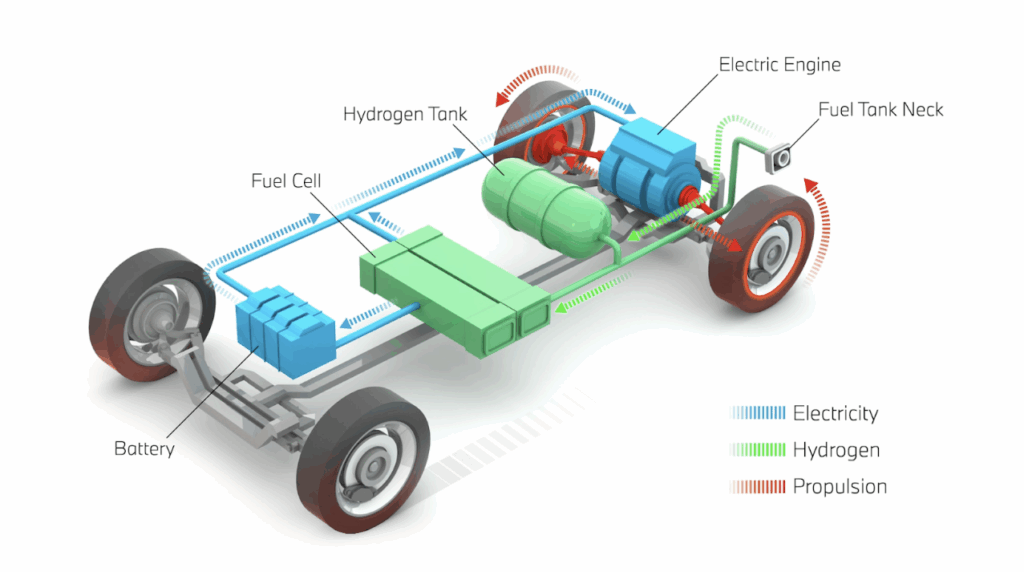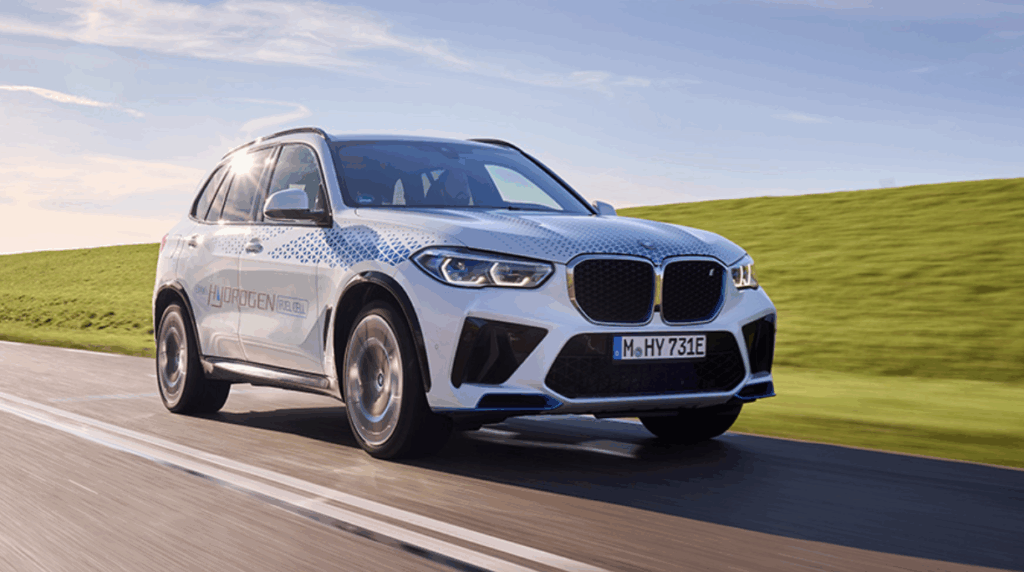As the global auto industry accelerates its push toward sustainability, BMW is taking a bold step beyond traditional electric vehicles. While most automakers continue to focus on battery-powered electric vehicles (EVs), BMW is placing serious bets on hydrogen fuel-cell technology as a key part of its long-term clean mobility strategy.
The Hydrogen Advantage
Hydrogen-powered vehicles, known as fuel cell electric vehicles, offer many of the same benefits as EVs: zero local emissions, smooth electric driving, and high efficiency. But they also solve two of EVs’ biggest challenges: long charging times and range loss in extreme temperatures. Refuelling a hydrogen car like the BMW iX5 Hydrogen takes just 3–4 minutes, and its range holds steady in all climates. BMW sees this as a crucial edge, especially for drivers and regions where EV infrastructure is limited or impractical.
Enter the BMW iX5 Hydrogen
BMW’s hydrogen flagship, the iX5 Hydrogen, had its debut in 2024 as a small pilot fleet. It’s powered by a fifth-generation fuel cell system, offering 400+ horsepower, a top speed of 185 kmh, and an estimated range of over 500 km, all while emitting only water vapour.
The vehicle combines BMW’s eDrive technology with a 400v battery and two hydrogen tanks, giving it the same smooth, quiet ride as a battery EV but with faster refuelling and a lighter footprint in terms of raw material use.
Why Hydrogen, and Why Now?
According to BMW CEO Oliver Zipse, hydrogen will play a “key role” in the future of mobility, particularly in regions where full electrification isn’t feasible. While EV adoption continues to grow, it is estimated that only 19% of new vehicles sold worldwide in 2024 were electric. That leaves a huge opportunity for hydrogen to complement battery EVs and accelerate the shift away from fossil fuels. Moreover, hydrogen can be produced using excess renewable energy, stored efficiently, and distributed where and when it’s needed, making it a flexible solution in the clean energy mix.

The Bigger Picture: BMW’s Sustainable Vision
BMW isn’t ditching electric vehicles. Instead, it’s diversifying its clean mobility strategy, aiming to offer consumers a choice between battery and hydrogen options depending on their needs. This balanced approach could help the company and the broader industry achieve climate goals more effectively. Beyond vehicle emissions, BMW is also investing in sustainable production processes, circular supply chains, and reduced resource dependency. Fuel cell systems, for instance, use fewer rare earth materials than EV batteries, reducing environmental impact.
Challenges Ahead
Despite the promise, hydrogen adoption faces hurdles such as high production costs, limited refuelling infrastructure and the energy-intensive process of isolating pure hydrogen. However, as infrastructure grows and green hydrogen becomes more accessible, BMW believes these challenges will be overcome.
Conclusion: A Dual-Path Future
BMW’s embrace of hydrogen isn’t a rejection of electric cars. It’s a recognition that no single solution fits all. By combining innovation with flexibility, BMW is positioning itself as a leader in sustainable, multi-path mobility. As the industry evolves, hydrogen may very well become the missing link in a greener, more accessible automotive future.
Resources:
BMW. (n.d.). How hydrogen fuel cell cars work. BMW Group. Retrieved April 19, 2025, from https://www.bmw.com/en/innovation
/how-hydrogen-fuel-cell-cars-work.html
MES. (2023, September 29). BMW says goodbye to electric cars; it has now solved the problem of hydrogen engines. Hydrogen Central. Retrieved April 19, 2025, from https://hydrogen-central.com/bmw-says-goodbye-to-electric-cars-it-has-now-solved-the-problem-of-hydrogen-engines-mes/
International Energy Agency. (2024, April). Global EV Outlook 2024: Trends in electric cars. International Energy Agency. Retrieved April 19, 2025, from https://www.iea.org/reports/global-ev-outlook-2024/trends-in-electric-cars
International Energy Agency. (2024, April). Global EV Outlook 2024. International Energy Agency. Retrieved April 19, 2025, from https://www.iea.org/reports/global-ev-outlook-2024
BMW Group. (2023, December 2). BMW iX5 Hydrogen enters limited production. BMW Group. Retrieved April 19, 2025, from https://www.bmwgroup.com/en/new
s/general/2023/BMWiX5Hydrogen.
BMW Toronto. (n.d.). Hydrogen cars. BMW Toronto. Retrieved April 19, 2025, from https://www.bmwtoronto.ca/hydrogen-cars/
BMW Group. (n.d.). Hydrogen. BMW Group. Retrieved April 19, 2025, from https://www.bmwgroup.com/en/

